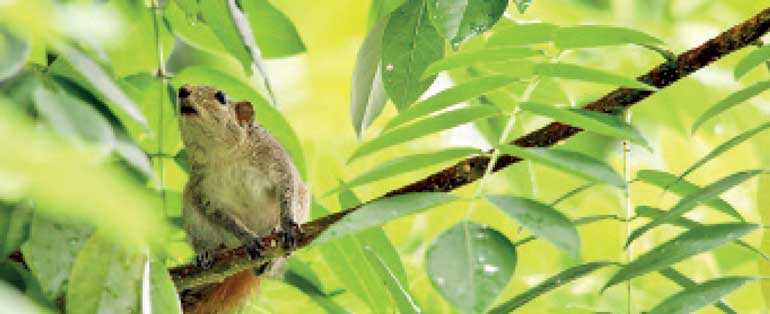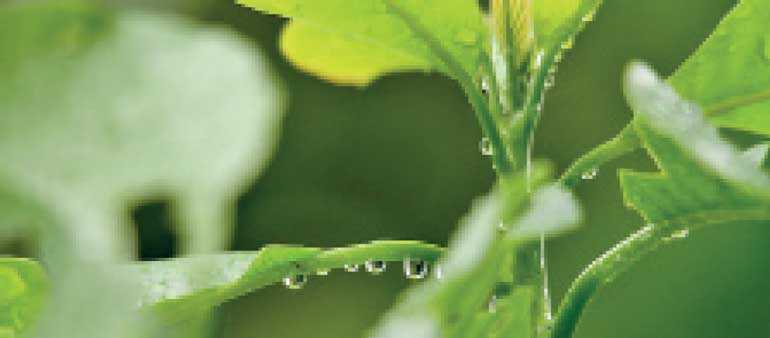Sunday Feb 22, 2026
Sunday Feb 22, 2026
Saturday, 6 July 2019 00:27 - - {{hitsCtrl.values.hits}}

The natural world that we are killing with garbage - Pix by Tharinda Elvitigala

By Dr. Mohamed Safiullah Munsoor
Our way of life is having a catastrophic impact on the environment, which is a looming existential threat to our civilisation. This is predicated on the ‘collapse of the world’s ice sheets due to rising temperature (NSIDC, 2019), which can cause the extinction of several animal and plant species’ (NCCR, 2019).
The contributory factors include high levels of greenhouse gas emissions resulting from the burning of fossil fuels, deforestation and intensive animal production underlined by our greed driven consumption patterns.
Let us first see what the divine scripture and the Prophetic narrative says about the multiple layers of our environment:
What’s in the Earth: “And He has cast into the earth firmly set mountains, lest it shift with you, and [made] rivers and roads, that you may be guided,” (Qur’an, 16:15) and “…And do not desire corruption in the land. Indeed, God does not like corruptors.” Qur’an 28:77. “Eat and drink from the provision of Allah, and do not commit abuse on the earth, spreading corruption.” (Qur’an, 2:60).Humans and their Responsibilities:
“And it is He (God) who has made you successors (khala’ifa) upon the earth and has raised some of you above others in degrees [of rank] that He may try you through what He has given you…” (Qur’an 6:165) and “And Allah has sent down rain from the sky and given life thereby to the earth after its lifelessness. Indeed in that is a sign for a people who listen.” (Qur’an, 16:65). “[But] you consume inheritance, devouring [it] altogether,” (Qur’an 89:17).
The Sky and Beyond: “And We made the sky a protected ceiling (canopy), but they, from its signs, are turning away.” (Qur’an, 21:32)and “Do you not see that Allah sends down rain from the sky and makes it flow as springs [and rivers] in the earth; then He produces thereby crops of varying colours; then they dry and you see them turned yellow;... Indeed in that is a reminder for those of understanding.” (Qur’an, 39:21).There are multi narratives supporting the divine scriptures derived from the actions and sayings of the Prophet:
Anas ibn Malik reported that the Prophet said, “If the Hour (the day of Resurrection) is about to be established and one of you was holding a palm shoot, let him take advantage of even one second before the Hour is established to plant it.” (Ahmed). Abdullah ibn Amribn Al-`Aas reported that the Prophet passed one day by Sa`d ibn Abi Waqas, while he was performing wudu’ (ritual cleaning of body parts in preparation for prayer). The prophet asked Sa`d, “Why is this wastage?” Sa`d replied “Is there wastage in wudu also?” The Prophet said, “Yes, even if you are at a flowing river.” (Ibn Majah).It was narrated that ‹Amr bin Sharid said: «I heard Sharid say: ‹I heard the Messenger of Allah say: Whoever kills a small bird for no reason, it will beseech Allah on the Day of Resurrection saying: O Lord, so and so killed me for no reason. And he did not kill me for any beneficial purpose» (An–Nasa’i).Let us unpack some of these verses and see its current relevance:What’s in the Earth: We have come into this world and been bestowed with land and water to harvest the earthly provisions, make our journey to sustain ourselves and see the abundance of God’s creations. We are cautioned not to abuse the provisions, that is, not waste or misuse them pointing to a ‘conservationist approach’. The repeated reference not to abuse and spread corruption in his world is ample indication that one needs to use resources judiciously, that is, not using for one’s own selfish motives to manipulate and squander it. Humans &their Responsibilities:
The real meaning is successors or vice-regent (khalifa) as referred to in above mentioned Qu’ranic verse represents, some-one who fulfils the function of someone else (Nasr, 2015).
The Harmony Page is generating a series of articles on how ancient as well as current spiritual and religious philosophies look at environment protection in their scriptures. The article below looks at Islam and references in the Quran to the natural world and man’s responsibility towards it
This refers to sustainable use of resources, as did all indigenous cultures, who used what was necessary, with much care and sacredness unlike us the post-modern civilisations, who are largely misusing and squandering our earth’s resources with little concern for the future. As rightly said in the scriptures ‘devouring’ and transgressing the freedom and rights of the others particularly the ‘have nots’. We have commoditised God-given nature, while consuming it well beyond our needs wittingly and unwittingly affecting ourselves and others.
The Sky and Beyond: We are so dependent on the rain that which gives life to the dead earth, while sustaining life and the eco-system of not only humans but the plants, animals and all other creatures inhabiting the earth. We generally do not stop to ponder on this God given miracle.
The multi-fold diversity of the plant and fruit species that have been provided is highlighted in the scriptures, while concurrently pointing out to its non-appreciation by humans.
The scripture points out that we generally tend to turn away from reality not really stopping to appreciate the gifts and taking it for granted, let alone looking after what has been given to us as vicegerents to protect.How does this ancient divine narrative fit into the UN global Sustainable Development Goals (UNSDG, 2016)? It is clear from these above scriptural verses and Prophetic narrations, that reforestation (SGD no: 15.2) is so vital, while avoiding any types of wastage be it pertaining to food (SDG no: 12.3) or water (SDG no: 6.4) and that we are ultimately accountable for our deeds and thus its conservation (SDG no: 12.2) is of paramount important. It is time that leaders and partners (SDG no: 17.16 and 17:17) awaken to the current realities to safeguard the environment for themselves and for the future generations since it does have dire consequences on our existence and on the eco-system.
Thus, education (SDG no: 4.5) in relation to conservation and climate change should become a part and parcel of all religious and scholarly education systems and narratives aimed at children, youth, men and women.
[Dr. Mohamed Safiullah Munsoor is a Sri Lankan national who studied at Royal College, Colombo and then moved on to complete his first Ph.D. in International Rural Development with focus on Local Organisations in Myanmar (University of Reading, United Kingdom) and his second Ph.D. in Spiritual Leadership and Self Development: A Case Study of a Spiritual Order in Malaysia (University of Malaya). He is currently the Director Programmes, with the International Dialogue Centre (KAICIID), Vienna, Austria involved in Interreligious Dialogue for Peacebuilding.]
References
The list outlines 17 SDG ~Goals and includes 230 indicators on which
general agreement has been reached,
last retrieved 15th June 2019; https://sustainabledevelopment.un.org/content/documents/11803Official-List-of-Proposed-SDG-Indicators.pdf